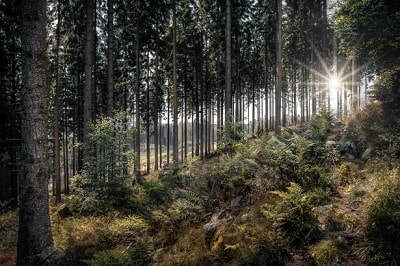Sylvan
 Did you ever wonder what Pennsylvania and Transylvania have in common? In brief, in both places, ‘sylvania’ refers to their forests.
Did you ever wonder what Pennsylvania and Transylvania have in common? In brief, in both places, ‘sylvania’ refers to their forests.Transylvania means ‘beyond the forest’. Pennsylvania is ‘William Penn’s forest’—named for William Penn (1621 – 1670), a British admiral who lent the English King Charles II money which in turn was repaid to his son in the form of land for a Quaker settlement in the American colonies.
The word sylvan (of the woods) came to English in the 1570s from French sylvain and Latin silvanus (pertaining to wood or forest). Originally, Latin silvanae referred to the goddesses of the forests, from Latin silva (woodland, forest, grove). The origin of silva is unknown.
The names Sylvia, Sylvester, and Silas are derived from Latin silva. The word silviculture refers to the art and science of managing, sustaining, and caring for the forests.1
Latin silva and silvaticus (of the woods, wild) are also the origin of the word savage which came to English in the mid-13th century via Old French sauvage (wild, untamed, strange). By the early 14th century savage mean animals or places that were wild, undomesticated, or untamed. By the early 15th century, the noun savage referred to a ‘wild person’ or to a person who lived in the wild.
The word savage, like the words heathen and pagan, originally referred to the places where people lived rather than to the people themselves. Unfortunately, such words have often been used rudely or disparagingly to describe the people not the place; in particular, those ‘other’ people who are not like ‘us’ (whichever ‘us’ to which you or I belong).
Silvanae or savage? Hmmm….
Reference: Online Etymological Dictionary, https://www.etymonline.com/
1 In case you are wondering, the Sylvania brand name for light bulbs is from the early 20th century when the fledgling company which produced the bulbs was based in Emporium, Pennsylvania—no apparent connection to forests!
Published on September 09, 2021 19:19
No comments have been added yet.



